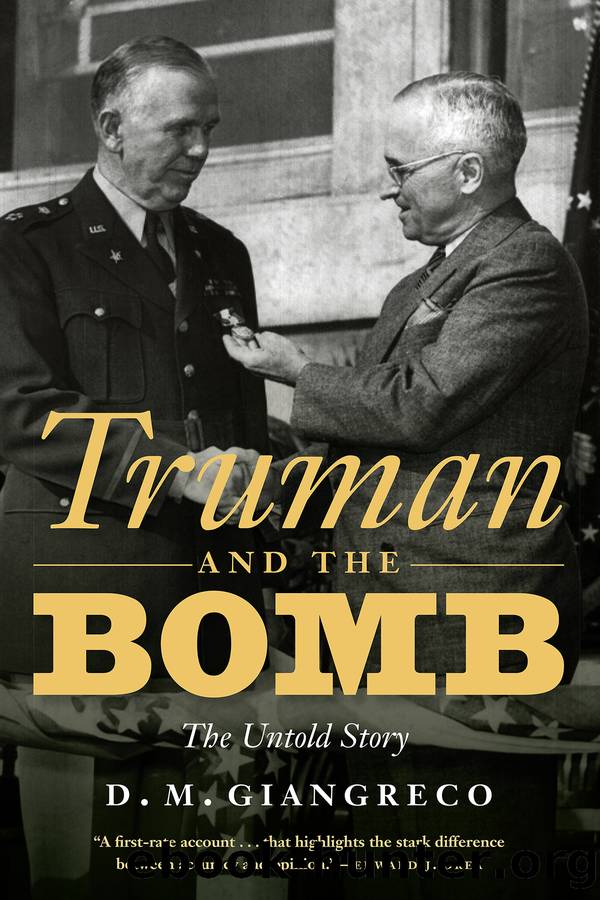Truman and the Bomb: the Untold Story by D. M. Giangreco

Author:D. M. Giangreco [Giangreco, D. M.]
Language: eng
Format: epub
Tags: HIS027100 HISTORY / Wars & Conflicts / World War II / General
Publisher: Potomac Books
The Rise of Revisionism and âAtomic Diplomacyâ
The orthodox consensus came under assault in the mid-1960s against the backdrop of the Vietnam War. The book that did the most to shift the nature of the discussion and, at least in academic circles, tilt the scales against Truman was Atomic Diplomacy: Hiroshima and Potsdam by Gar Alperovitz, who mounted a direct assault on Americaâs use of the atomic bomb by insisting that it was used not for military but rather diplomatic reasons and that its real target was not Japan, the country that was attacked, but the Soviet Union, presumably an American ally at the time. Specifically, Alperovitz argued that in the summer of 1945 the Japanese were prepared to surrender if granted terms permitting them to keep their emperor, that Truman and his top advisors knew it, and that Washington deliberately withheld those terms, instead demanding unconditional surrender and ignoring Japanese efforts to end the war. Washingtonâs âtwo overriding considerationsâ for bombing Hiroshima and Nagasaki were to keep the Soviet Union out of the war in the Far East, thereby limiting its postwar gains in that region, and to pressure Moscow to moderate its demands and accommodate American concerns regarding postwar Eastern Europe. This âatomic diplomacyâ in turn precipitated the Cold War.7
Atomic Diplomacy was not an easy read. In formulating what may be called the hard-line revisionist position on the bombing of Hiroshima, Alperovitz laced his 275-page narrative with more than 1,400 endnotes. In many paragraphs almost every sentence has a citation; many sentences have two. After a while the clutter of notes seems like a swarm of gnats that must be swatted away so one can get at the text itself. Still, by their sheer number and density, the notes gave Atomic Diplomacy a scholarly veneer that impressed many readers, and, although it debuted to mixed reviews, the book was enthusiastically welcomed by enough historians on the political left to set in motion a process that eventually put the Hiroshima decision on the defensive. In some vocal circles Atomic Diplomacy quickly achieved iconic status.
The enthusiasm was misplaced. Some commentators, including several prominent Cold War revisionists, pointed out that Alperovitz either lacked any evidence to back up his claims or had stretched the meager evidence he cited beyond its breaking point. Eventually a few historians dug deeperâmost notably and comprehensively Robert James Maddox, whose critique of Atomic Diplomacy appeared in 1973. Maddox found that Alperovitzâs footnotes could not be trusted. For example, Maddox pointed out that Alperovitz misled his readers about the context of important statements. Thus, while Alperovitz tells his readers that in April 1945 Truman said the Soviets could âgo to hellâ if they did not make concessions regarding the composition of the Polish government, an accurate reading of the relevant primary sources shows Truman was referring to a possible Soviet boycott of the founding conference of the United Nations if Stalin did not get his way on Poland, in which case the United States would proceed with the conference while the Soviets could âgoâ elsewhere.
Download
This site does not store any files on its server. We only index and link to content provided by other sites. Please contact the content providers to delete copyright contents if any and email us, we'll remove relevant links or contents immediately.
The Radium Girls by Kate Moore(12028)
100 Deadly Skills by Clint Emerson(4925)
Rise and Kill First by Ronen Bergman(4788)
The Templars by Dan Jones(4689)
The Doomsday Machine by Daniel Ellsberg(4490)
The Rape of Nanking by Iris Chang(4211)
Killing England by Bill O'Reilly(4001)
Stalin by Stephen Kotkin(3965)
Hitler in Los Angeles by Steven J. Ross(3946)
12 Strong by Doug Stanton(3550)
Hitler's Monsters by Eric Kurlander(3342)
Blood and Sand by Alex Von Tunzelmann(3203)
The Code Book by Simon Singh(3189)
Darkest Hour by Anthony McCarten(3130)
The Art of War Visualized by Jessica Hagy(3007)
Hitler's Flying Saucers: A Guide to German Flying Discs of the Second World War by Stevens Henry(2754)
Babylon's Ark by Lawrence Anthony(2678)
The Second World Wars by Victor Davis Hanson(2524)
Tobruk by Peter Fitzsimons(2516)
